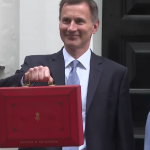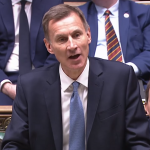Climate change & cuts
In my recent “a-z of why cuts are mad“, “George Osborne: move over Keynes” and on our campaign site www.noshockdoctrine.org.uk, I give a number of reasons why I oppose cuts – unemployment, the need for fiscal stimulus, the value of public services, and the fact that government borrowing, from the other side of the balance sheet, is our pension fund investments. However, there is one important reason which no one is talking about.
Over the next 5 years, we need massive investment in building a low carbon economy. We have a small window in which global emissions must start to come to a steady decline. In the UK, this means that this Parliamentary cohort will preside over what will come to be seen as a crucial period of British history: where we know the importance of acting, and still have time to do so.
During boom years, greenies tended to argue for regulation to steer finance behind low-carbon infrastructure – whether regulation of the finance itself (see the People & Planet/PLATFORM campaign against pre-bailout RBS) or regulation to make polluting activities less cost effective than cleaner equivilents – taxes on flights, Renewable Obligation Certificates, etc. The idea is pretty simple: if you make bad things pay to reflect their true cost, this hits profit margins, and money will come in behind good things.
But what happens when capital dries up? You can’t pay for wind farms with money for new coal power stations if no one is building the things. And what if you desperately need to build those wind farms, so you can shut down the old coal power stations?
Sure, lots should come from State owned banks like RBS. But you need government investment.
This can be paid for a number of ways – Tobin (“Robin Hood”) tax, higher taxes on capital gains, closing of loopholes, etc.
But if it is better done through bonds, then I’d love to hear Nick Clegg argue on the Today program (as he tried today when talking about public services) that it’s unfair to make my generation pay interest on loans which were not only effectively our parents pensions being invested into giving us jobs, but also saved our future. Because, just as the long term payoff on most public services is higher than the interest on loans to pay for them, the long term costs of climate change dwarf the charges that our pension funds will bill the government for their loans.
And, of course, it isn’t all windfarms.
Action on climate change means mass investment in research at universities – and in the undergraduate education which will deliver the researchers of the future. It means investment in schools as centres of learning – because we must learn to aspire – as we used to – to knowledge, culture and arts rather than the accumulation of junk. It means ensuring everyone has a well insulated home, and affordable public transport.
And it means doing all of these things now.
3 years ago, there was a case that taxes and regulation would steer capital behind these projects. As credit dries up, this cash must come from the government. Because if it doesn’t, then our dying economy will continue to splutter out the noxious fumes choking my future.



It had been wonderful to study through your write-up. I just appreciated the little while that I used looking at it and needed to leave a comment to mention that….Regards
I sort of found your blog by accident, but your blog site caught my attention and i also thought that I’d post tell you that I really like it.
I’m still learning from you, while I’m trying to achieve my goals. I certainly enjoy reading all that is written on your site.Keep the stories coming. I enjoyed it!
wind farms are great but they also take up a large land area-.;
wind farms are eco friendly and can generate massive amounts of electricity’,-
wind farms are great but they also take up a large land area-.;
actually it is not that hard to setup wind farms, the only problem is that it requires lots of capital investment.,”: